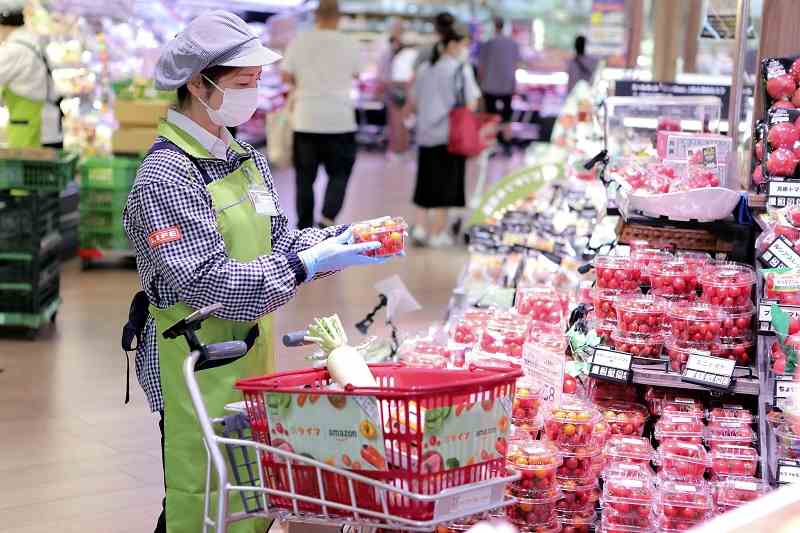
A Life Corporation store employee selects items ordered via the online supermarket service, on July 3, 2020.
16:28 JST, June 7, 2021
The demand for shopping online has seen a steady rise since consumers started to refrain from going out amid the coronavirus crisis. After wading in first mainly by necessity, Japan’s retail giants have started to get serious about expanding their online supermarket operations, making significant moves to also compete with Amazon.com.
Seven & i Holdings Co. has announced plans to build its first two large-scale distribution centers in the Tokyo metropolitan area that will utilize artificial intelligence and robotic systems. The distribution bases will be set up in Chiba and Kanagawa prefectures, where the company has already secured land for the sites. Seven & i aims to have them operational by 2025.
When a customer places an order by smartphone, robotic systems at the logistics bases will automatically select and pack the items. For deliveries, AI will be used to select the most efficient route.
Ito Yokado superstores, supermarkets in the Seven & i Group, began offering online supermarket services in 2001, and as of the end of March, about 110 stores, or 80% of the company’s stores, were selling online.
At present, employees select ordered products at stores, with additional manual labor needed for the shipping process. For this reason, the retailers have not been able to fully respond to customers’ requests during holidays and evenings, when orders tend to be concentrated.
By setting up a dedicated logistics base and using the latest technology to improve efficiency, the company will be able to deliver products faster.
Competitors are also stepping up their efforts. Aeon Co. has partnered with a major online supermarket company in the U.K. and is building a large automated warehouse in Chiba City that is scheduled to start operations in 2023. Seiyu has teamed up with Rakuten to operate large warehouses in Chiba Prefecture and Yokohama, and has also begun trials of unmanned deliveries using drones and robotic systems in some areas.
The novel coronavirus crisis has been a tailwind for online supermarkets. The total amount of orders at Rakuten Seiyu online supermarkets in the first three months of this year increased 30% compared with the same period last year.
Competition from Amazon is one of the reasons why domestic retail giants are stepping up their efforts.
In addition to daily necessities, home appliances, and books, which Amazon has traditionally sold, it partnered with Life Corp. in 2019, and began handling fresh food and other products for its paying members. Now it is competing with the retail giant also in the supermarket business.
In the U.S., retail giant Walmart, which was often overwhelmed by Amazon, is accelerating its digital strategy to be more competitive.
Yutaka Suzuki, a senior researcher at the Distribution Economics Institute of Japan, said: “If they don’t respond digitally, they will lose. It is also important to differentiate themselves by increasing the attractiveness of the products they carry.”
Top Articles in Business
-

Prudential Life Insurance Plans to Fully Compensate for Damages Caused by Fraudulent Actions Without Waiting for Third-Party Committee Review
-

Narita Airport, Startup in Japan Demonstrate Machine to Compress Clothes for Tourists to Prevent People from Abandoning Suitcases
-

Japan, U.S. Name 3 Inaugural Investment Projects; Reached Agreement After Considerable Difficulty
-

JR Tokai, Shizuoka Pref. Agree on Water Resources for Maglev Train Construction
-

Toyota Motor Group Firm to Sell Clean Energy Greenhouses for Strawberries
JN ACCESS RANKING
-

Japan PM Takaichi’s Cabinet Resigns en Masse
-

Japan Institute to Use Domestic Commercial Optical Lattice Clock to Set Japan Standard Time
-

Israeli Ambassador to Japan Speaks about Japan’s Role in the Reconstruction of Gaza
-

Man Infected with Measles Reportedly Dined at Restaurant in Tokyo Station
-

Videos Plagiarized, Reposted with False Subtitles Claiming ‘Ryukyu Belongs to China’; Anti-China False Information Also Posted in Japan




















